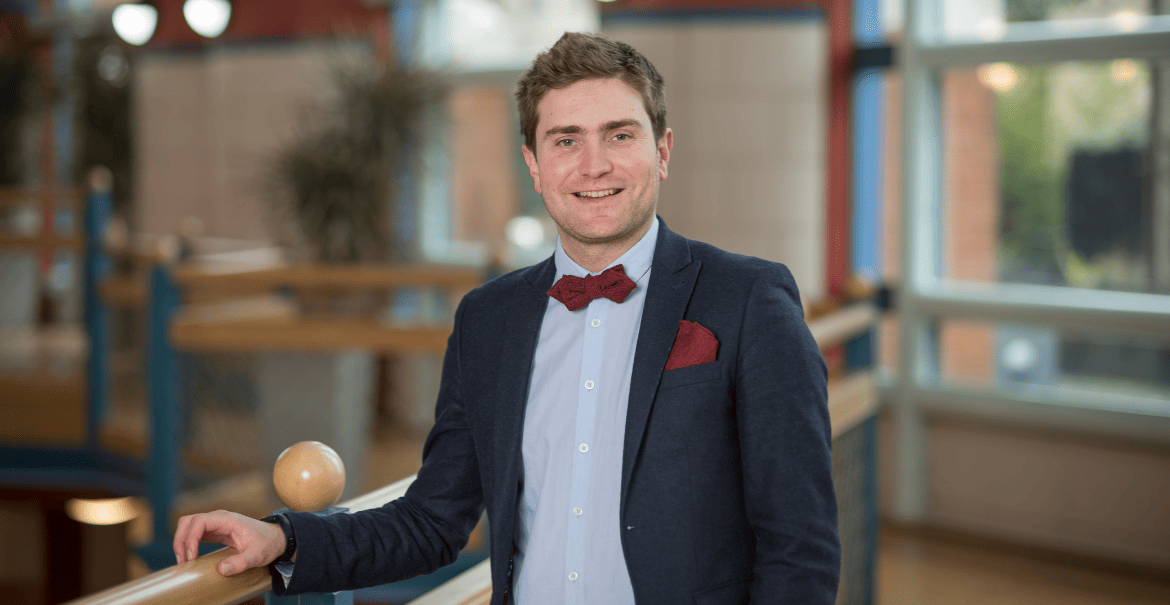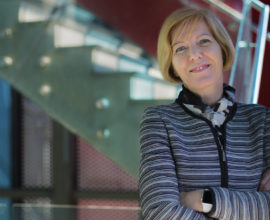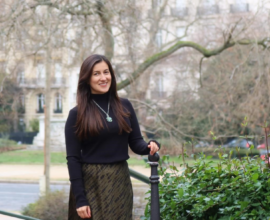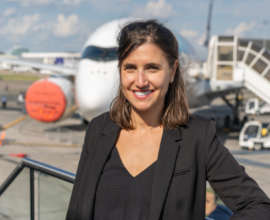Thomas Roulet
Cambridge's Frenchie professor
![]() Reading Time: 8 minutes
Reading Time: 8 minutes
Deputy Director of the MBA Programme, Cambridge Judge Business School
In 2009, Thomas Roulet graduated from Sciences Po and Audencia’s Grande École Master in Management programme. Today he is an Associate Professor at Cambridge University, Deputy Director of the MBA at Judge Business School and co-director of the incubator at King’s College Cambridge. He contributes to numerous magazines and publications, such as Forbes and Harvard Business Review.
He is teased about his accent and his friends ask him to choose the wine at mealtimes. Professor Roulet’s French touch is like a signature that he wears happily, especially on the day after France’s football team defeats England. He even claims to bake his own galette des Rois because “you can’t find any good ones in Cambridge”.
Thomas enjoys this French impertinence, which gives a special touch to his journey from a finance student at Audencia to an associate professor in organisational theory at Cambridge. With enduring ties to France, Thomas delights in a job in England that, in his Harry Potter gown and in 800-year-old buildings, plunges him into the heart of society’s greatest debates on one of the most renowned campuses in the world.
Thomas, tell us about your journey to Cambridge
It’s a long and winding story which started fairly characteristically during my preparatory classes. When I started at Audencia, like lots of others, I thought I would do marketing. In the end, I went into finance and did my year-long internship in investment banking in London.
I enjoyed this first experience but found it disappointing. I wanted to delve deeper and understand what was going on behind the curtain of our social interactions. At the same time, I’d always had this taste for teaching. I imagined what went on behind the scenes, when professors were not in front of their students, preparing classes, correcting assignments, carrying out research, etc. When I came back from London, I returned to the classroom to try and find out more about what was going on behind the scenes.
By then, I’d decided to double up my final year finance course with a Research Master at Sciences Po. In fact, my research internship at the Organisation for Economic Co-operation and Development (OECD) counted towards both Masters.
I really liked the stimulus of the research Master’s degree, so I started a PhD at HEC. Again, I really enjoyed it. In my second and final year, I was teaching at Sciences Po and Audencia. Once a week, I taught strategy to international students, an experience that I really enjoyed.
When did you decide to export your academic career?
Halfway through my PhD, I had the opportunity of being a Visiting Scholar at Colombia University in New York. I loved it, especially because Audencia had cultivated my taste for the United States.
Then, after my thesis, I needed to choose between Vanderbilt in the United States and Oxford in England, I chose Oxford for its geography, which suited me better from a family point of view at that time in my life.
Oxford was very different to London. The culture there is deeply British and much less international than in London. And the college world is fascinating, with its old buildings that house candlelit dinners and a real English-style academic aristocracy. The codes are very particular. It was then I then decided to pursue an academic career in England rather than in France or elsewhere.
Tell us about the British universities
Academia in France is divided into business schools and technical or generalist grandes écoles, whereas the UK has a real university culture. Business schools are integrated into much larger faculties, with, in my opinion, much more interdisciplinarity.
British universities are divided into departments, like in France, and into colleges, which were originally student residences like the ones you see in films. Today, it is much more than that; everything, including the social life, educational experience, culture and symbolism of an 800-year-old college, takes place there.
For a professor in Britain, taking on responsibility in a college is usual – it is very much about individualised support and tutoring students. Compared to other professorial activities, this part of the job isn’t particularly well paid, but it is highly valued and very interesting.
For my part, I co-direct the incubator at King’s College Cambridge, the former college of John Maynard Keynes and Alan Turing. I really enjoy this aspect of my job, as it is extremely diverse. One of the biggest challenges, by the way, is the funding we get from major donors. Our budget is partly covered by the sponsorship of David Sainsbury’s Gatsby Foundation. This involvement of patrons, particularly alumni, is another marker of difference.
How did your career path take shape between Oxford and Cambridge?
After Oxford, I went to Bath, in Somerset, a medium-sized city with a well-known university. I stayed there for a year before heading for King’s College, the London one – the British like to call places King’s or Queen’s Something. For three years, I ran the Master in International Management there.
In 2018, when the opportunity to join Cambridge arose, I took it and I have since been an Associate Professor of Organisational Theory and Deputy Director of the MBA there. My research work focuses on the sociological and psychological approach to organisations.

You said that you enjoy the backstage work of professors. Can you explain what this consists of?
There’s this idea that professors only work when they’re in a classroom with their students and that the rest of the time they don’t do much. This is not true, of course! I work much harder as a professor here in Cambridge than I did when I was working in finance in London (laughs).
Most of my time is taken up with resarch: collecting data, writing, editing and publishing research papers, supervising PhD students and post-docs. In theory, this represents more than 60% of my time. I also participate in four or five editorial boards of journals where I review papers and do some editing work.
I see research as a basis for engaging in the debates that are shaking up society. For me, research is not about producing concepts in an ivory tower but about asking questions that matter to people and producing ideas that find their way into managerial and societal practice. In the coming years, one of the topics I would very much like to have an impact on is the issue of mental health, from a skills perspective but also with regard to hybrid work, comparing remote and face-to-face.
Teaching is the other main part of my work, which I really enjoy. At Cambridge, we do a lot of tutoring, which gives me the opportunity to teach small groups of three or four students, with a very different relationship to the one you find in a lecture hall.
I teach courses at the faculty of business and the faculty of sociology. Each year I teach leadership and organisational behaviour to over 200 students on my MBA programme. The content is all extremely topical and changes constantly. In the past few years, I have totally adapted my course to the topics of the moment to include themes of hybrid work, silent quitting, Diversity & Inclusion issues, etc. After COVID-19, we rethought the whole teaching structure, keeping some courses online and promoting small agile groups on topical issues such as the Black Lives Matter movement or leadership biases.
Sector bias, gender bias, disability bias, ethnicity bias, etc., contribute to the funnel effect, i.e., the success of a Diversity & Inclusion policy at the bottom of the organisation but its failure at the top. I also do a lot of work on invisible stigma, such as invisible disability or sexual orientation, and how certain categories of people are exhausted by working on raising awareness, the ‘diversity work’ that is asked of them and the risks of burnout and performing badly.
Tell us about your experience at Audencia
It seems like ages ago but sometimes as if it was only yesterday. I think I’ve kept more in touch with the faculty than with my classmates but this is probably due to the career I’ve chosen.
When I wanted to pursue an academic career, I got in touch with a few alumni who had followed a similar route. I was impressed to see that several alumni are quite well known in this field. I am thinking of David Dubois, now Professor of Marketing at INSEAD, who gave me some great advice back then and Fabrice Lumineau, Professor of Strategy in Hong Kong.
As for most people, my student journey itself was a multi-faceted experience. I became who I am now in the classrooms of Audencia, which is undoubtedly why I have kept in touch with quite a few figureheads. I was also president of Réseaudencia Junior, the forerunner of the school’s young alumni association. However, there were also more complicated moments to handle, like losing the student campaign for the BDA (Bureau des Arts). I realise now that at the time it affected my relationship with the school. You don’t always realise how difficult it is for young people just out of preparatory classes to cope with things like that.
If I had to do it all again, I don’t think there’s much I would change. I really enjoyed my AIPM internship year and the international flavour of the school. I felt very French when I started Audencia, before discovering wider horizons during my studies.
My internship year nurtured my desire to live abroad but also to do things to the fullest. This I owe in part to an alum who worked on the desk that recruited me. He was instrumental in giving a chance to a student from the same school as him. The alumni network is one of the assets of this school.
Today, you still have close ties to Audencia
Yes I do; through my teaching activities and as an affiliate professor. At the beginning of my career, I used to come once a week to teach strategy. Now I don’t come as often but as an international affiliate faculty member, I still come over for a few days each year to partner with Audencia professors on their publication process.
More importantly, I’ve been lucky to work closely with some of the faculty, including Sandrine Frémeaux, who was one of my favourite professors when I was a student. She is a wonderful, fascinating person who manages to make law exciting. Today, I have the pleasure of working with her on a paper due to be published soon. It’s a privilege I would never have thought possible back when she was my professor!

How do you see the next stages of your career?
I’m already lucky to be a tenured professor at Cambridge, so I have some control over my choices between research, teaching, student support and influencing public policy. However, the holy grail would of course be to get a professorship.
I am eligible but the application process is long and tedious, as one would expect in such a venerable institution. I filled out a fifty-page application with letters of recommendation and convincing arguments.
However, being a tenured professor gives me the opportunity to do other things besides research, hence my investment in the incubator and in the life of King’s College. I really enjoy this entrepreneurial aspect of my job.
And more generally, how do you see the future?
I live in a country that is going simultaneously through the consequences of Brexit, the pandemic and a global energy and economic crisis. We’ve recently lost a lot of European friends because of Brexit and I’d certainly love to see people return as there are still great opportunities, not just in finance.
I would like alumni to continue to look at Britain as an attractive choice to live and work. For me, expatriation is a great experience, a real asset. I love being French outside France.
We are often caricatured, and in fact, at the university, we French colleagues are seen as the grumblers. In meetings, we’re the ones who argue or get upset and our hierarchy doesn’t always like it. However, I like the idea that in France, we don’t have problems challenging what we think is questionable.
Beyond that, expatriation is an adventure and filled with shared experiences. When I watch football with my brother-in-law, I’m torn between the two sides but I get to win each time! In many ways I feel British today, but for them I am French first and foremost. Maybe it’s my accent (laughs).
My advice to students today is to go for the expatriation adventure, even if it’s just for a few months or even a few years. It’s worth it.
What can we wish you for the coming year Thomas?
A successful application for the professorship, no doubt. Also to have time to spend with my friends, here and in France, and with my parents too.
I don’t have much downtime. I manage to fit in a morning bike ride. I don’t have any wild wishes for 2023, maybe just to feel that the link with Europe is not broken forever.



